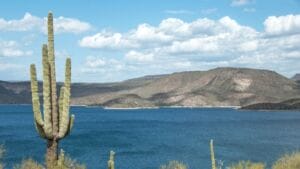Sander van der Leeuw, the dean of Sustainability at Arizona State University, is among the six winners of the 2012 United Nations Champions of the Earth award. Professor van der Leeuw, an archaeologist and historian by training, was recognized in the science and innovation category for his research in human-environmental relations and the scientific study of innovation as a societal process. He is one of 51 Champion laureates who have received the UN award since it was launched in 2005.
The Champion of the Earth honor is the UN flagship environment award that recognizes outstanding visionaries and leaders for their inspiration and action on the environment. The list of previous Champion laureates includes former U.S. Vice President and Nobel Peace Prize winner Al Gore, Mexican President Felipe Calderón, Chinese actress and environmental advocate Zhou Xun, Biomimicry Institute President Janine Benyus and former Soviet leader and Noble Peace Prize winner Mikhail Gorbachev.
This year’s recipients include Mongolia’s President Tsakhia Elbegdorj, Brazilian banker Fábio C. Barbosa, renewable energy entrepreneur Sultan Ahmed Al Jaber, renowned Swiss aeronaut Bertrand Piccard and Kenyan Maasai conservationist Samson Parashina.
“Each of these six winners has stood up to be counted – often in the face of opposition from those not championing change but championing the status quo,” said Achim Steiner, UN Under-Secretary General and the executive director of the United National Environment Programme (UNEP). “In doing so, these winners have and continue to display the political will, fresh thinking and creative solutions.”
Professor van der Leeuw, a citizen of the Netherlands, first directed a series of regional archaeological research projects in Syria, Holland and France aimed at understanding the long-term evolution of the relationship between societies and their environments.
Later, his work focused on bringing a long-term perspective to the problems of present-day desertification and land degradation, observing how changes in the natural environment are linked to technological, sociological and economic changes. This involved as many as 60 researchers from 11 European countries and focused on research areas in all the Northern Mediterranean rim states. His team was the first to bring the complex adaptive systems approach to bear on the problems of the environment.
“As an environmental change and sustainability scholar, I think the foremost challenge is not so much in the science, though there are many areas where we don’t know enough and more work needs to be done, but in communicating the inevitability of having to change our mindsets and attitudes to make sustainability the core of our everyday behavior – individual and political decision-making,” van der Leeuw said.
Van der Leeuw first came to ASU as a visiting professor in 2000. At the same time, he also was a visiting professor at the Santa Fe Institute in New Mexico. He then became an External Professor at the Santa Fe Institute, a position he still holds. He returned to ASU in 2004 to become the founding director of the School of Human Evolution and Social Change in the College of Liberal Arts and Sciences. In 2010, he was appointed dean of the School of Sustainability in ASU’s Global Institute of Sustainability (GIOS), a strategic research area in the Office of Knowledge Enterprise Development.
“Sander is internationally recognized for his intellectual leadership for understanding how Earth’s complex systems adapt to stress and the process of innovation and how both of these factors have affected human evolution and social change,” said Rob Melnick, executive dean at ASU’s Global Institute of Sustainability and its School of Sustainability. “Most importantly, Sander’s teaching and research has significantly helped scores of students, faculty and researchers determine what can be done to ensure a successful, sustainable future.”
The Champions of the Earth awards were presented at a ceremony on June 4 in Rio de Janeiro as one of the official events leading up to the United Nations Conference of Sustainable Development, known as Rio+20. The conference is being held 20 years after the 1992 Earth Summit in Rio where countries adopted Agenda 21, a comprehensive plan to rethink economic growth, advance social equity and ensure environmental protection. Thousands of world leaders and representatives from governments, the private sector and NGOs are expected to attend Rio+20, to held June 20-22, and focus their discussions on two themes: a green economy in the context of sustainable development and poverty eradication, and an institutional framework for sustainable development.



